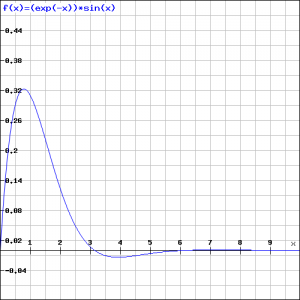Return to Assignments Improper integrals
Assignment 5
Calculate:
![]()
Solution
It is clear that this integral converges, because the function ![]() is greater than
is greater than ![]() from some value of
from some value of ![]() . The integral of the first function yields a finite result (converges) and this will be the case with the second function. See the graph of
. The integral of the first function yields a finite result (converges) and this will be the case with the second function. See the graph of ![]() in the figure.
in the figure.
The integral has a finite value.
We first look at the calculation of the indefinite integral and use integration by parts:
![]()
![]()
![]()
It seems that this has not helped us a lot, but by applying integration by parts again we get the following result:
![]()
Verify this result by differentiation.
Now we get:
![]()
Return to Assignments Improper integrals


